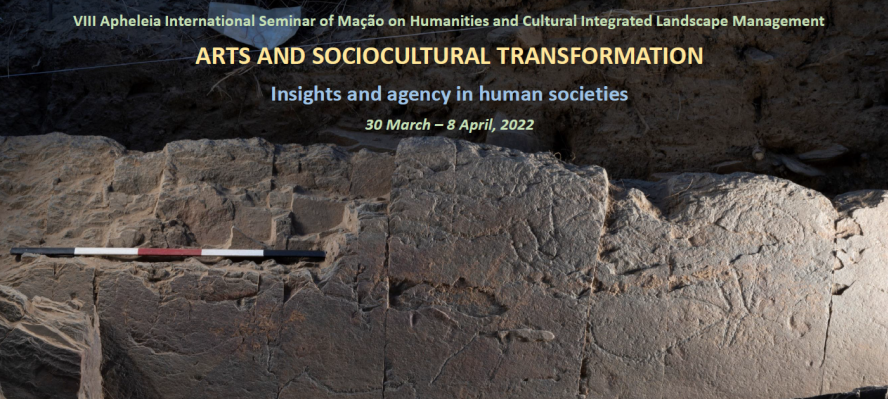APHELEIA 2022 : du 30 Mars au 8 Avril

English version below
CHAMP D'APPLICATION
La dynamique socioculturelle est simultanément conditionnée (par les ressources matérielles disponibles, les autres humains, la logistique, les techniques héritées, la structure sociale), informée (par les traditions culturelles, la recherche et l'innovation, y compris la technologie) et motivée (par les besoins perçus, les intuitions et la prévoyance).
Si les arts sont souvent considérés comme l'expression ultime du génie humain ou comme un loisir/divertissement, il convient de reconnaître que, depuis l'invention de la notion de symétrie, il y a plus de 1,5 million d'années, les humains consacrent de plus en plus une partie de leur temps à produire, partager et apprécier des expressions comportementales qui allient créativité, réflexion, utilité non immédiate, performance, communication, maîtrise des techniques et, parfois, critique. Ce faisant, les arts intègrent des dimensions immatérielles dans des objets, des rituels et d'autres expressions matérielles.
L'intérêt des sociétés pour ce type d'expressions humaines est bien documenté depuis la préhistoire jusqu'à l'époque contemporaine. Mais quel est son rôle, ou ses rôles, dans la société ? En tant qu'enquête non académique, l'art peut offrir un aperçu de la signification, des valeurs, des défis ou des besoins, mais comment ceux-ci sont-ils liés à la gouvernance, à la compréhension et à la prévision d'une communauté ?
Le VIIIe séminaire international APHELEIA explorera ces thèmes en adoptant une approche interculturelle, à travers le temps et l'espace. Il réunira des artistes et des chercheurs en sciences humaines, en se concentrant notamment sur le rôle des arts dans la structuration des paysages culturels.
QUI
APHELEIA est ouvert aux artistes, chercheurs et étudiants en arts, études culturelles, archéologie, histoire, anthropologie, géographie, droit, littérature et autres sciences humaines et sociales, ainsi qu'à d'autres domaines scientifiques qui interagissent avec les sciences humaines.
QUAND ET OÙ
Le séminaire aura lieu au centre culturel Elvino Pereira, à Mação, Portugal, du 30 mars au 8 avril 2022. Toutes les sessions seront en présence, bien que, en raison de la pandémie, le nombre de participations sera limité.
COMMENT
Les participants doivent s'inscrire sur le site www.apheleiaproject.org, dès maintenant, et envoyer par courriel une proposition de titre, un résumé (150 mots, en anglais et dans une deuxième langue) et 3 à 5 mots-clés (également bilingues), à itm.macao @ gmail.com. Le message doit inclure les données suivantes : Nom, prénom(s), affiliation institutionnelle, profession. S'il s'agit d'un étudiant, veuillez indiquer le titre et le niveau du diplôme ainsi que votre contact e-mail.
Les étudiants, comme les années précédentes, devront préparer un essai sur l'un des thèmes du séminaire, en démontrant leur capacité à offrir un raisonnement multidisciplinaire et à encadrer la discussion dans les préoccupations de durabilité globale. Les étudiants présentant un essai et participant au séminaire pendant toute sa durée seront évalués et recevront un certificat. Le séminaire correspond à 10 ECTS.
SCOPE
The sociocultural dynamics is simultaneously conditioned (by available material resources, other humans, logistics, inherited techniques, social structure), informed (by cultural traditions, research and innovation, including technology) and motivated (by perceived needs, insights and foresight).
While the arts are often understood as an ultimate expression of human genius or as a leisure/entertainment, it is worth acknowledging that, since the invention of the notion of symmetry, over 1,5 million years ago, humans have growingly devoted part of their time to produce, share and appreciate behaviour expressions that bring together creativity, reflection, non-immediate usability, performance, communication, mastering of techniques and, sometimes, criticism. By doing so, the arts embed intangible dimensions into objects, rituals and other material expressions.
The interest of societies for this type of human expressions is well documented since prehistory till contemporary times. But what is its role, or roles, in society? Being a non-academic kind of inquiry, art may offer insights on meaning, values, challenges or needs, but how do these relate to a community governance, understanding and foresight?
The VIII APHELEIA International Seminar will explore these themes taking a cross-cultural approach, through time and space. It will bring together artists and human sciences researchers, focusing, in particular, the role of the arts in structuring cultural landscapes.
WHO
APHELEIA is open to artists, scholars and research students in arts, cultural studies, archaeology, history, anthropology, geography, law literature and other human and social sciences, as well from other scientific domains which interact with the Humanities.
WHEN AND WHERE
The Seminar will take place in Cultural centre Elvino Pereira, in Mação, Portugal, from the 30th March to the 8th April, 2022. All sessions will be in presence, although, due to the pandemic, the number of participations will be limited.
HOW
Participants should register at the website www.apheleiaproject.org, from now, and send via email a proposed title, abstract (150 words, in English and a second language) and 3 to 5 keywords(also bilingual), to itm.macao @ gmail.com. The Message must include the following data: Surname, Name(s), institutional affiliation, profession. If student, please indicate the title and level of the degree and your email contact.
Students, as in previous years, will be expected to prepare an essay on one of the themes of the seminar, demonstrating a capacity to offer a multidisciplinary reasoning and to frame the discussion within global sustainability concerns. Students delivering an essay and attending the Seminar from the whole duration, will be assessed and awarded a certificate. The seminar corresponds to 10 ECTS.

 Faculté de Sciences
Faculté de Sciences